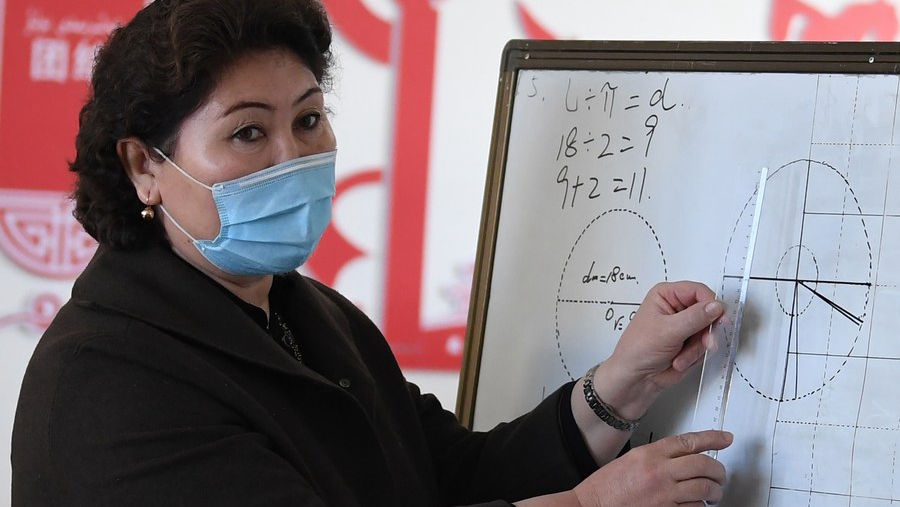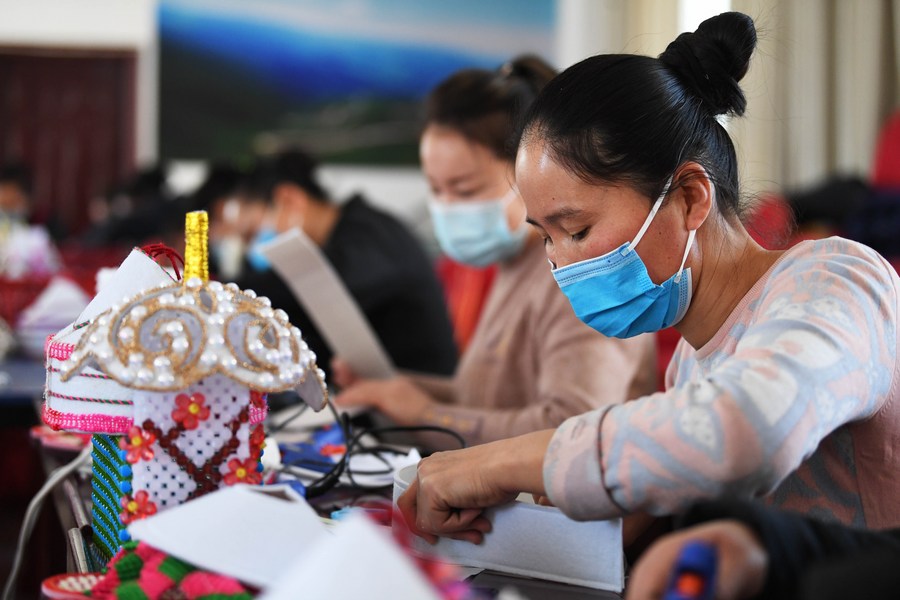
An instructor gives a vocational skill lesson at Kurti Village, Sarhulsun Township, Altay City, northwest China's Xinjiang Uygur Autonomous Region, January 30, 2021. /Xinhua
An instructor gives a vocational skill lesson at Kurti Village, Sarhulsun Township, Altay City, northwest China's Xinjiang Uygur Autonomous Region, January 30, 2021. /Xinhua
Editor's note: Fiona Sim is a London-based freelance political commentator and public sector worker. The article reflects the author's opinions and not necessarily the views of CGTN.
The BBC's latest article on China reads more like an opinion piece than a news report. Using lines like "But the warm wind blowing across the Taklamakan desert is bringing with it worry and change," the news outlet is spinning a tale that does not align with reality.
Based on a television broadcast from four years ago in 2017, the article accuses China of forcing Uygur villagers to separate from their families and undertake forced labor in factories halfway across the country. Citing the notorious Adrian Zenz, the far right ideologue who has made his biased agenda against China crystal clear, the BBC's credibility has taken another nosedive with this farcical piece.
Manipulating the source material
The focus of the article is a 19-year-old woman in Xinjiang who is being persuaded by local officials to take up a job opening in Anhui, a province 4,000 km away. The BBC's cut of the video implies that male officials coerced her into saying yes, showing clips of her crying as she leaves home. It conveniently cuts out scenes from the original report where it is shown that it was actually another young woman, an outbound migrant worker, in a neighboring village who convinced the 19-year-old to take up the opportunity. Starting to look and sound like a broken clock, the BBC has yet again resorted to cheap gimmicks.
The BBC fails to contextualize the recruitment drives within China's war on poverty. Just days ago, the country celebrated the official end of absolute poverty – the liberation of nearly 100 million people from a life of deprivation of opportunities.
This may seem odd from a Western perspective but migrant workers are no stranger to developing countries like China. Rural dwellers will often travel across the country to work where pay is higher than in local areas. Xinjiang, for instance, is undergoing industrial development but it is hindered by the geography of the region: lack of arable land, less rainfall, desertification and natural disasters. The resultant restrictions on what industries can be developed has meant that the economy has not been able to support Xinjiang's growing population, which has historically relied on agriculture and animal husbandry.
In order to circumvent this, growing industries in other regions of China have been able to absorb this surplus and enable a significant increase in employment and annual income for residents of Xinjiang. Back home in the UK, the BBC reports on worrying peaks of unemployment and increasing poverty levels, yet it chooses to vilify state-led efforts to combat this in China. The news outlet would almost have you believe that poverty is a good thing, that the people of Xinjiang should not aspire for a higher quality of life.
Numerous independent reports have studied the living conditions and opinions of migrant workers who have come from Xinjiang. There have been zero findings of coercion or involuntary. Migrant workers have reportedly been able to save a lot of money, as many workers are eligible for free or subsidized housing close to their workplace, while couples and families can be provided private apartments. Alongside this, enterprises provide meal allowances for private cooking or use of the company's canteen with Halal catering.

Villagers learn to make handicrafts at Kurti Village, Sarhulsun Township, Altay City, northwest China's Xinjiang Uygur Autonomous Region, January 30, 2021. /Xinhua
Villagers learn to make handicrafts at Kurti Village, Sarhulsun Township, Altay City, northwest China's Xinjiang Uygur Autonomous Region, January 30, 2021. /Xinhua
Distorting women's rights
It is a fact that China, similar to the rest of the world, is still combating patriarchy and working to achieve gender equality in all spheres of life. In impoverished areas of Xinjiang, women have tended to be less educated, earn less and have less financial independence than their male counterparts.
This is not a unique phenomenon to China, no less Xinjiang. Taken from the United Nation's 5th Sustainable Development Goal: "Achieve gender equality and empower all women and girls," point 5.5 states, "Ensure women's full and effective participation and equal opportunities for leadership at all levels of decision-making in political, economic and public life."
For women to have full and equal opportunities, it is the state's responsibility to ensure women are empowered to experience life beyond the domestic sphere and are able to earn money for themselves. For young women like Buzaynap in Xinjiang, this means being granted independence outside of their families to explore their interests, talents, dreams and goals in life. The poverty alleviation schemes and surplus rural labor force recruitment drives enable women to do just that. These jobs are gateways to improve existing skills and develop new ones with the support of the state.
As an adult, Buzaynap should not have to rely on the permission of her father alone to decide the rest of her life, so it is incredulous that the BBC article makes it out to be a bad thing that outside influences and opinions are introduced to her. For many women across the world, the options to choose are not presented to them. Homemaking and child rearing, incredible feats of skilled labor in themselves, are the only choice they have been exposed to due to their circumstances.
It was not long ago that women in the West were fighting for the rights to vote, own property, and work as something other than an unpaid homemaker/housewife. When white women in the West fight against gender roles and seek independence, it is empowering, but how is it that Uygur women cannot do this without being portrayed as damsels in distress?
Uygur women and women of all ethnic groups in China are more than capable of fighting for and liberating themselves. They do not need a "white savior" in the form of unprofessional British news outlets that misrepresent them.
(If you want to contribute and have specific expertise, please contact us at opinions@cgtn.com.)

